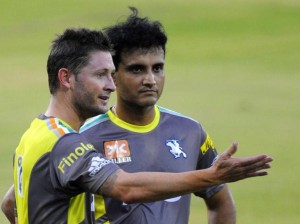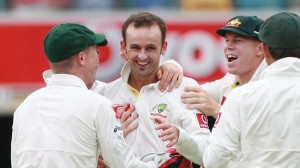
A gradual but inevitable descent into cricket-based loathing and bile.
The Madness Of Captain Clarke
Amidst the flood of plaudits that followed in the wake of Ricky Ponting’s Test retirement came what, at the time anyway, seemed a fairly innocuous statement from Michael Clarke. Clarke professed that he couldn’t see himself playing Test cricket at Ponting’s age. Given that Ricky was already 73 at this point (oh, alright, 37), that didn’t seem all that remarkable, but in light of the rather ‘interesting’ developments in the Australian Test team in recent times, we have had pause to reconsider. In short, is Clarke in this Test captaincy gig for a good time or a long time?
Just how long does Clarke intend to hang around? We have no idea, but would be surprised if he sees himself still playing Test cricket in four years’ time (particularly in light of his ongoing back complaint), when he will be 35. His recent return to T20 cricket, where he will be just one of a team of champions with Pune in this year’s IPL, suggests he already has one eye on his career after Test cricket. With David Warner a ready made replacement for role of captain (yes, we’re deadly serious: this will happen), Clarke seems intent on achieving his goals within a relatively small time frame, and then stepping down having successfully revived Australian cricket.

A champion team or a team of champions? Pune are both.
The Australian Test team is clearly fixated on its self-pronounced crusade to reclaim the number one position in the Test rankings. Indeed, Mickey Arthur seems to find it hard to talk about anything else. It would appear that the current management team as a whole is under the simple remit of returning the Australian team to the top of the heap as soon as possible. Presumably Cricket Australia believes the fickle Aussie public won’t support anything other than a World Champion team for long, and will instead soon move onto pastures new. Like, er, what are Australia world champions in these days? Ferret racing?
Now Clarke is naturally a pretty attacking captain at any rate, but when that tendency is integrated into an overall team ethic as described above (an ethic Clarke would have had no small part in helping formulate), you get a particularly volatile mix. Clarke wants to win all the time. Half measures are seemingly not part of his vocabulary, and draws are definitely out of the picture. Such an approach twins nicely with the aims of the team as a whole, but it seems to be making the mistake of failing to take into the consideration the quality of the cattle that surrounds the captain. Is Michael Clarke, and the team management as a whole, simply asking too much of this current less than brilliant Australian team?
Let’s consider the two most recent humiliations dished out to Australia, against South Africa in Perth late last year, and here in Mohali. On both occasions the Australian attack was publicly flayed in the most embarrassing manner possible. Admittedly on both occasions they went in with less than full strength attacks, owing to Slushiegate in the Perth Test, and Homeworkgate in Mohali, but Australia’s depth in their bowling stocks are supposed to be their greatest asset, so there must be more to it than that.

There was a time when we imagine Clarke embraced long overseas tours…
On both occasions Clarke maintained attacking fields for far longer than seemed at all sensible. Bowlers were encouraged to bowl full and straight, tempting the batsman to drive, and attacking fields were set to take advantage of mistakes. But those mistakes never came, and instead the fielding cordon was pierced time and time again. Clarke only relented when the game was already essentially gone, with the opposition having been allowed to rocket along at over five runs an over for a session or more. A more cautious captain would cut his losses far earlier, spread the field and try and contain the batsmen for a while. But that’s not really Clarke’s way. He just wants to win.
If Clarke was surrounded by players like Warne, McGrath, and Mick Lewis (okay, we made that last one up), then such a ruthless approach would be both commendable and probably highly effective. But with this current mob it just seems to be counter-productive. Clarke wants this current team to be winners. He seemingly isn’t interested in the long term, or even the medium term. He wants to win now, he wants to win the Ashes, and he seems to want to be captain of the number one Test team in as short a time as possible.
It could be argued that this approach is proving detrimental to the squad’s development. It has already arguably led to a number of conflicts within said squad (although whether that’s a positive or negative development is arguable). The impact on a player like Nathan Lyon has been noticeable, with the team’s number one spinner now looking a broken shell of a man compared to even six months ago. The obsession with all-rounders seems to be likewise a symptom of this relentless pursuit for success. A player like Moises Henriques (or even, shudder, Glenn Maxwell), potentially offers depth and flexibility. The key word here though is potentially. These things take time, and throwing Moises into the mix as a first change bowler in Test cricket is likely to only have the one result: Moises joining Lyon for a lengthy appointment with the team’s psychiatrist.

Nathan Lyon in happier times.
We are not deliberately attacking Clarke’s captaincy; in fact we’re all massive fans here of what he brings to the game. God knows his brand of attacking captaincy is probably the only thing capable of making the upcoming Ashes series interesting. Instead we are suggesting that ulterior motives may be influencing his decisions, to the potential detriment of the team as a whole. We entirely understand if Clarke doesn’t particularly see himself playing Test cricket till he is an old man. Having seen his wife, we wouldn’t want to be away from home much either. But you can’t really take shortcuts in Test cricket, and there is a suspicion that is exactly what Clarke is trying to do.

No Comments
Post a Comment